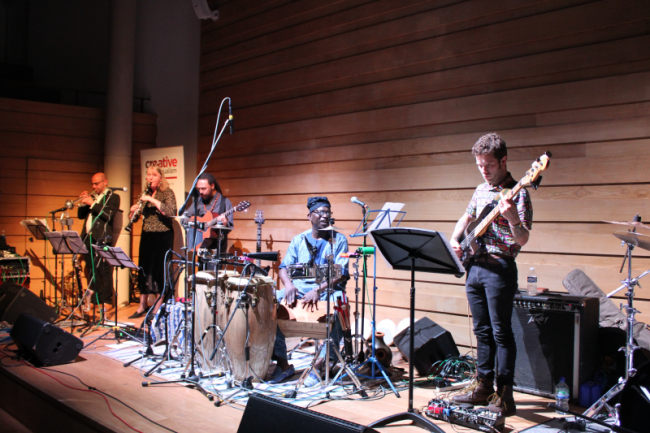Yoruba Sonnets: creative multilingualism in action

Friday night’s (15/2/19) Yoruba Sonnets event at Wolfson College was part of a project initiated over 20 years ago by Birmingham-based Lekan Babalola, to explore the oral poetry associated with the ancient Nigerian philosophy and divination system Ifa, and to introduce it to other cultural contexts. This may sound like the outline for a dry-as-dust worthy academic lecture…
Instead, two-times Grammy Award winner Lekan arrived with the other musicians who form his ‘Sacred Funk’ group and treated us to an astonishing evening of compositions and rhythms drawing upon Afro-beat, funk, and West Indian reggae, with New Orleans jazz and English folk music thrown in for good measure. The percussionist Lekan sits at the centre and plays a huge range of wooden, plastic and steel instruments, his magical hands flying from cymbals to drums. Lekan’s wife Kate Luxmoore is a superb clarinettist, and there were terrific performances from their colleagues on trumpet, guitar, bass and drums as well. The audience in the Wolfson auditorium was swaying and clapping, and by the end leaping to their feet to dance by their seats.

But offering us a great musical gig was only part of the occasion. Most of the pieces performed on the stage were accompanied by a hypnotic performance by Dr Olu Taiwo, who is a Senior Lecturer in Performing Arts at the University of Winchester. Stepping out of his seat from time to time, but remaining in the shadows in front of the stage, the slender outline of his body performed sketchy dance movements, his feet almost always staying connected to the ground. His gestures were at once graceful and slightly jerky, and with a touch of humour to them as well. It was balletic, but also with reflections of other influences ranging from Tai Chi to hip-hop and Capoeira.
At the same time, Dr Taiwo gradually unfolded for us a narrative about the Yoruba people and the natural environment they live in, with references to roots, kernels, groundnuts, the tree of life, mountains, and the ocean, as well as diaspora and international travels. All of this helped to construct a story about ancestry and tradition, oracles, and a world-view shaped by divination and a quest for harmony achieved through equilibrium.

As he explained it afterwards, in the Q&A led by Professor Rajinder Dudrah, the Yoruba Ifa tradition is as much a way of life or philosophy as it is a religion, and in this sense it has features in common with belief systems such as Buddhism. Dr Taiwo was sharing with us just one tiny fragment of the mighty epic of Yoruba poetry, which he compared in its significance with texts such as the Mahabharata. The phrasing was evocative, incantatory, constantly revisiting, repeating or developing key phrases and images, and was all delivered by Dr Taiwo in a calm and laconic manner which drew the audience even closer towards the world he was conjuring up.
This was creative multilingualism in action. The fundamental project of ‘translating’ Nigerian culture for a British audience was achieved through music and performance drawing on traditions from four continents, blending and mixing the languages of poetry and music to create an entirely new art-work, while also conveying the essence of the original. As the Jewish bass guitarist Tom Ford remarked, ultimately all modern music can be rhythmically traced back to West Africa, and these deep rhythms therefore constitute a shared language we can all thrill to and understand.
My own Russian guest’s Facebook description of this Creative Multilingualism “concert of African fusion-jazz with philosophical verses, translations of the mystical teachings of the Yoruba People” is already gathering likes across Russia as well, spreading Yoruba culture still further afield, and into another language again.
Julie Curtis is Professor of Russian Literature at the University of Oxford and Senior Researcher on Creative Multilingualism's 4th strand, Languages in the Creative Economy.
Watch the film below for an overview of the performance:
Photos from the event:



Where next?
Read audience feedback from the Yoruba Sonnets performance and see more photos of the event